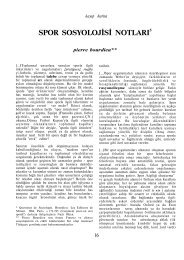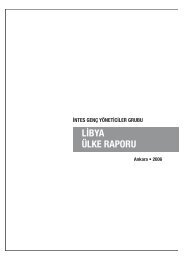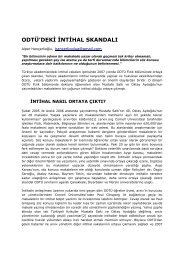Untitled
Untitled
Untitled
You also want an ePaper? Increase the reach of your titles
YUMPU automatically turns print PDFs into web optimized ePapers that Google loves.
INTRODUCTION 9<br />
messianic philosophy of Ernst Bloch, with whom he was later to become<br />
friends.25 Lack, as he well knew, is a bad architect and the 'home' of<br />
transcendence cannot be restored just because it might provide<br />
protection.<br />
What alternative is left between the Scylla of abstract rationality and<br />
the Charybdis of faded doctrines of salvation? The question leads back<br />
to 'Those Who Wait' The title of this essay is not without ironic<br />
implications. It echoes a letter from Franz Rosenzweig who had<br />
criticized Kracauer's sceptical distance from the religious reformers as<br />
'Waiting with folded arms - and folded behind your back to boot'.26<br />
The attit.ude, however, that Kracauer proposes - he describes it as 'an<br />
attempt to move out of the atomized unreal world of shapeless<br />
powers and figures devoid of meaning and into the world of reality and<br />
the domains it encompasses'27 - is not that of the onlooker. It may<br />
rather be associated with a figure who will reappear in another guise in<br />
Die Angestellten: the figure of the stranger. Kracauer carefully locates the<br />
'one who waits' in a metaphorical context of 'exile from the religious<br />
sphere' and of 'moving into [einkehren] the world of reality' For what<br />
he aims at is the stance of an intellectual who seeks to make the exile of<br />
transcendental homelessness, if not into a home, at least into a familiar<br />
dwelling. The 'one who waits' is certainly not yet the ethnologist of the<br />
'newest Germany' But he is already the stranger, who has decided to<br />
slay in the modern world. Because he does not know where else to go -<br />
and because he is curious.<br />
The essay 'Those Who Wait' appeared just a few months after Kracauer<br />
had joined the editorial staff of the feuilleton of the Frankfurter ZeitunK as<br />
a regular freelance contributor. The proximity of the dates indicates a<br />
connection that is not just accidental. For the intellectual moderniz<<br />
lion that Kracauer projects is also and essentially a literary<br />
intimately linked to the institution of the feuilleton. Here Kracauer<br />
lilUnd the forum that suited his interest in the quotidian and his plans<br />
li)r public activity. Here were literary traditions that could be used to<br />
pursue the 'big' questions not in the form of philosophical systems but<br />
in reference to the phenomena themselves. Here, finally, he was offered<br />
a field for experimentation, where the concreteness of thought he<br />
strove for could be converted into styles and genres that crossed the<br />
�stablished boundaries between scientific disciplines as well as between<br />
journalism, literature and philosophy. Kracauer was not the only one to<br />
take advantage of the possibilities of the feuilleton for reflection upon,<br />
and criticism of, modernity. Authors like Joseph Roth, Ernst Bloch or<br />
Walter Benjamin likewise recognized its potential. Thanks to Kracauer's






